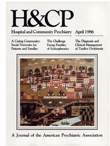An Innovative Approach to Assessing Outcome of Long-Term Psychiatric Hospitalization
Abstract
The failure of research on longterm hospital treatment to show consistent relationships between length of stay and treatment outcome may reflect a need for more refined measures to evaluate long-term treatment. The authors developed an individualized method of assessing improvement in patients' major areas of impairment over the course of treatment. Using the new approach and two more traditional methods, the authors evaluated the outcome of 37 discharged long-term patients of a private psychiatric hospital who had been rated at admission and discharge on 21 variables related to ego function; affective symptoms; risk of suicide, self-destructiveness, and violence; substance abuse; level of treatment alliance; and, at discharge only, on overall level of improvement. Although the traditional methods failed to show a correlation between length of stay and most of the variables, the individualized approach found that a longer hospital stay was related to greater improvement in areas of most impaired functioning.
Access content
To read the fulltext, please use one of the options below to sign in or purchase access.- Personal login
- Institutional Login
- Sign in via OpenAthens
- Register for access
-
Please login/register if you wish to pair your device and check access availability.
Not a subscriber?
PsychiatryOnline subscription options offer access to the DSM-5 library, books, journals, CME, and patient resources. This all-in-one virtual library provides psychiatrists and mental health professionals with key resources for diagnosis, treatment, research, and professional development.
Need more help? PsychiatryOnline Customer Service may be reached by emailing [email protected] or by calling 800-368-5777 (in the U.S.) or 703-907-7322 (outside the U.S.).



